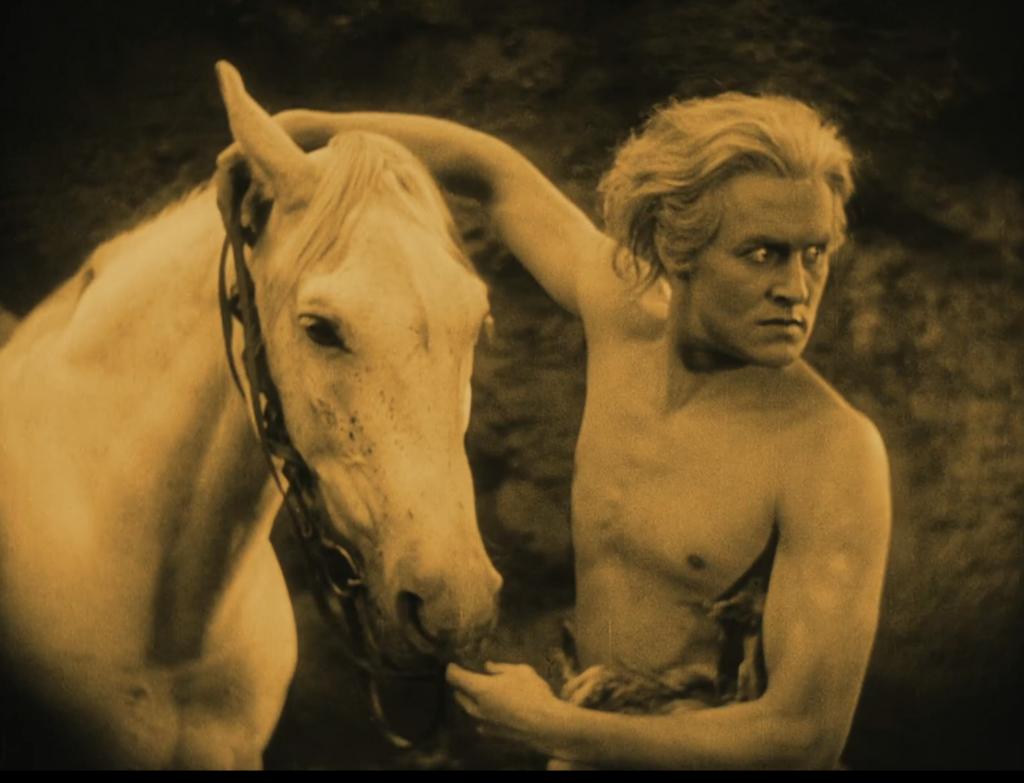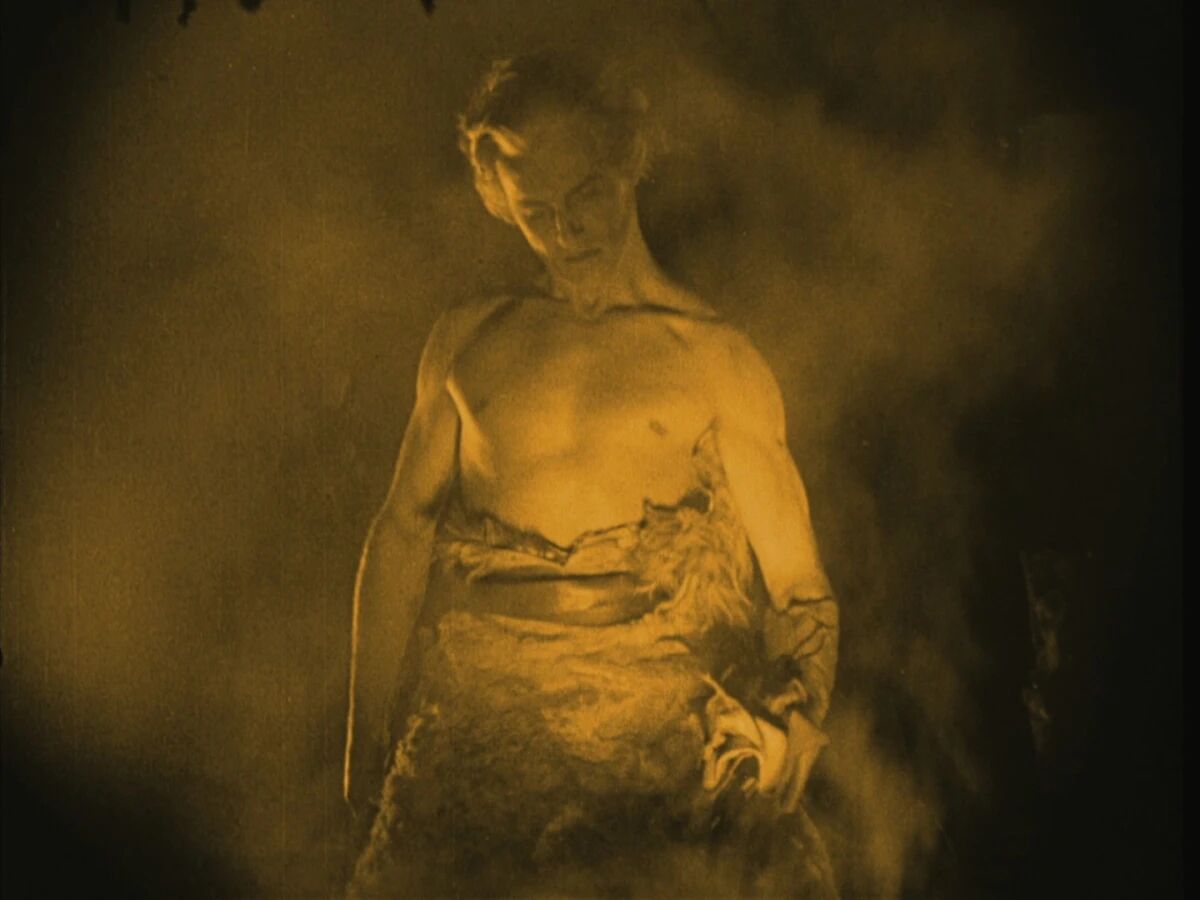One of the most fascinating stories I’ve ever heard concerns the director Fritz Lang, the dictator Hitler, and a possibly apocryphal twist ending. It goes a little something like this:
Adolf Hitler, a longtime fan of the work of Metropolis director Lang, propositioned him to be his head of propaganda in 1933. Only, as the story goes, it wasn’t exactly a fair proposition: it was a kind of, “do this or I’ll kill you” gambit, because that is famously how the Third Reich did business. Hitler had his chief propagandist Joseph Goebbels deliver the news to Lang that he was about to become head of Nazi propaganda—at which point Lang packed his bags and headed for France to make one Charles Boyer movie (the splendid Liliom) before heading to America to make more of the stark, high-contrast noirs we now know him for.
But before that, before the Third Reich became the order of the day, Lang had made one of Hitler’s favorite films of all time in 1924’s Siegfried, a technically-advanced adaptation of the 13th-century epic poem Die Nibelungenlied, which told the story of a brave (blonde, Aryan) hero who slays a dragon but is later killed by treachery.
Lang’s adaptation came in two parts: the first, Siegfried, focused on the Aryan hero of myth. The second installment focuses on Siegfried’s wife Kriemhild as she orchestrates her bloody revenge against the men who killed her husband. But it was Siegfried that Hitler loved most: he picked up on the nascent nationalism that would come to define the film industry under Third Reich rule, made up of those tall tales about blood quantum and blonde purity that would make it easier for an entire nation to view Jews—as well as other “deviants” and “undesirables” such as queer people, people of color, and folks with disabilities—as objects for extermination.
There’s one little contradiction here: Siegfried happens to be extraordinarily gay. Like, very gay. As in: hours of watching a hot guy walk around without a shirt on gay. As in every character standing in pure worship of this random hot dude for no apparent reason gay.
There’s also a canon lesbian character in Siegfried: the Amazon warrior Brunhilde. She refuses to give herself to any man who can’t best her in battle, and before she meets Siegfried, no such man exists. But when Siegfried disguises himself as his betrothed’s brother, King Gunther, to win Brunhilde’s hand for the cowardly king, she’s forced to marry him. When she learns the truth, of course, she’s pissed: and she sets in motion a plan to have Gunther kill Siegfried, despite Gunther’s obvious attraction to the young demigod.

Much like Achilles, Siegfried is nearly immortal after taking a bath in a special spring, except for a small spot on his back which happens to get covered by a leaf during the process. This is how it happens that Siegfried is killed after being speared through the back by one of Gunther’s cronies. It’s an extremely sexual scene even in the original 13th-century text, which describes the villain Hagen planning to kill Siegfried during an outing:
“Then he spied for the secret mark on his vesture; and while Siegfried drank from the stream, Hagen stabbed him where the cross was, that his heart’s blood spurted out on the traitor’s clothes.”
In the film, this stabbing is visualized as a penetration, more cinematic and intimate than even Hector’s death by Achille’s hand. Siegfried sees the spear emerge through his chest after being plunged through the exact spot on his back where the leaf fell, it goes cleanly through him. With this stroke the wound becomes sexual:
“When stark Siegfried felt the deep wound, he sprang up maddened from the water, for the long boar spear stuck out from his heart.”
Hagen then: “left the spear sticking deep in his heart, and fled in grimmer haste than ever he had done from any man on this earth afor.”
The scene ends with a statement: “Kriemhild’s husband fell among the flowers.” The fact that Kriemhild foresaw the whole thing in a dream is a final twist of the knife.
What makes matters even gayer, perhaps, is Kriemhild’s love throughout for her extremely hot husband. This love, and its betrayal, are the operatic force behind the second film, an incestuous saga bloody enough to rival (and possibly even inspire) the “Game of Thrones” universe. Perhaps this is why Hitler didn’t like the second film in the series as much as the first. There was a lot less man meat happening in Kriemhild’s Revenge, for one. And secondly, who cared what happened once the beloved Aryan hero was dead?
The epic poem had been set to music some decades before, by another Nazi favorite, the composer Richard Wagner. But Lang’s film is gayer than the “Ring Cycle” could ever be. It’s a movie about forbidden desire, the pain of first love, and the death of trust. Truly what could be queerer than that?

“Every night before going to bed,” Ben Urwand writes in his book “The Collaboration,” “Adoph Hitler watched a movie.” His passion for film was a defining factor in his totalitarianism. He picked up on the fact that film has the power not only to inspire, but to corrupt: to make bad actions appear heroic, and to make entire groups of human beings appear disposable. He had a canny understanding of the power of film editing, and indeed, Fritz Lang’s collaborator and longtime wife, Thea von Harbou stayed in Germany because of her own belief in Hitler. Like the Hitler collaborator Leni Riefenstahl, von Harbou’s belief in the Third Reich was tied to her belief in the power of cinema. The political power of film was something that was becoming more and more apparent to political leaders leading up to World War II, the first war in which dedicated, government-funded propaganda films became the norm. In America, FDR tried to fight fire with fire. He tasked some of America’s finest filmmakers, John Ford and Frank Capra among them, with creating films that would counter Hitler’s message of racial hate, while minting a different kind of American propaganda in the process.
Fritz Lang fought Hitler’s propaganda a different way: in the states, he would make politically-charged films about social justice, sexual obsession, and the fear of totalitarianism. He never spoke to Thea von Harbou again, and he never forgot the time he, a half-Jewish filmmaker responsible for some of the most influential films of the German Expressionist movement, almost got eaten up by Hitler’s fascist propaganda machine. ♦
Don't forget to share:
Help make sure LGBTQ+ stories are being told...
We can't rely on mainstream media to tell our stories. That's why we don't lock our articles behind a paywall. Will you support our mission with a contribution today?
Cancel anytime · Proudly LGBTQ+ owned and operated
Read More in Entertainment
The Latest on INTO
Subscribe to get a twice-weekly dose of queer news, updates, and insights from the INTO team.
in Your Inbox













